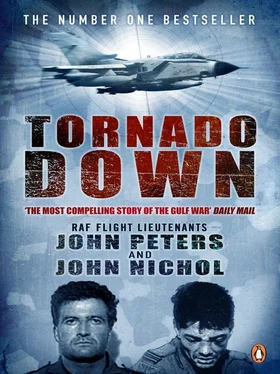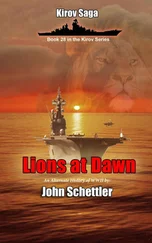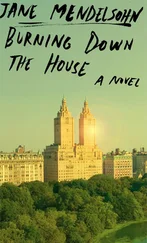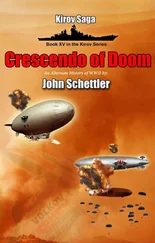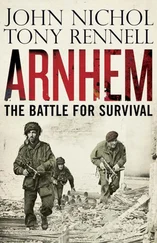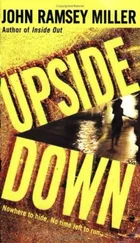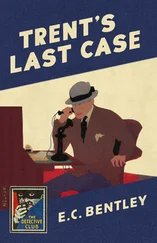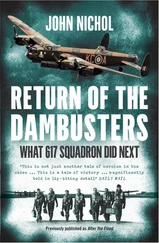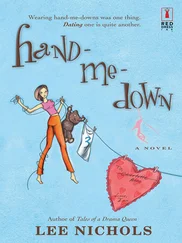My group of released POWs landed at Laarbruch on Sunday, 10 March, after the long flight from Cyprus, to the sight of crowds of well-wishers standing on the tarmac waving and cheering. As we took our first steps back onto home ground, the exploding flashes from the hordes of press photographers seemed to make the bright spring day even brighter. The Commander-in-Chief, RAF Germany, was there to meet us, along with his wife, a wonderful lady who seemed more overcome than the rest of us. It was a fantastic reception.
A car whisked me off to a private reunion with my mother and father, and Paul. I walked down the corridor to find them all standing in one of the Ops Rooms. I didn’t really say anything. I couldn’t. All four of us were just standing there holding each other; words were not necessary. After a while we sat down and chatted about little things like how the rest of the family were getting on. It soon became clear that everybody had had a worse time than I had, thanks to the relentless attention of the press and the wildly variable reports, both official and in the media.
I can forgive my captors for my own treatment, but I will never forgive them for the pain and torment that my family endured, all because the Iraqis refused to release the names of the people they held.
After our private reunion we adjourned to the Officers’ Mess for a more public party.
It was undoubtedly the best day of my life!
It was Mothering Sunday.
When I returned home with them to the northeast of England, it was to what I can only describe as a hero’s welcome. I didn’t feel much like a hero, but they gave me the full treatment anyway. The local press had really picked up on the ‘local lad shot down’ story. It is hard to describe the intense quality of the local response, different in kind to the national attention, or to the more reserved acclaim John Peters told me he received down south. A warm people, the Geordies took me noisily to their hearts. It was great – the perfect antidote to the hatred and isolation of Iraq. My family has always lived in North Shields, and has all kinds of ties to the community. Across the road from our house is a large school. Its windows were colourful with Union Jacks, its walls bedecked with Welcome Home posters, with Good Luck messages. The children there had adopted my cause for the duration of the war. This was true of several other schools in the area. I had a lot of thanking to do. I visited all the schools, met the children, or rather they mobbed me, yelling for autographs! I visited the local police force, which had done a superb job protecting my besieged parents around the clock. Finally, I called on our local British Telecom guys, who had been so helpful in stopping the press harassment.
Venturing out, the response was amazing, people stopped me in the street to congratulate and hug me. They were complete strangers for the most part, but they suddenly seemed like part of some giant extended family. I went out in the evening with my brothers and sister to some of the pubs we had frequented as teenagers. No sooner did we set foot across the threshold than the music would be turned off, someone would jump onto the stage and welcome us over the PA system… People would crowd round, competing to offer us free drinks. It was completely unexpected, and quite hard to believe. And it was wonderful.
The only thing was that every time there was a loud bang, or any kind of sudden noise, I jumped out of my skin. We had all noticed this, when we were on our way out, in Iraq and in Cyprus. We would be standing in a room, a door would slam, and there we were, all taking cover, terrified half to death. It was part of my post-traumatic stress, the result of the bombing, when the prison came down around our ears. There was a railway line about half-a-mile south of my parents’ house. I lost count of the number of times I found myself sitting bolt upright, staring into the dark, sweating as a train went rumbling past. The noise was no longer comforting. It was just like the rumble of the incoming bombs.
During the war, everybody in the family was in touch every day. It drew them all closer together. It was something I noticed immediately when I got home.
I had received lots of letters from prisoners all over the world, Israel, India, Russia. Most of them were addressed very simply: The Navigator, North Shields, England. Or The Pilot, Newcastle. Flowers came every day, masses and masses of them.
John Peters: The next day, Helen showed me the scrapbooks, filled to bursting with the press cuttings she had collected over the course of the war and since. The extent of the coverage was staggering. In almost every case, there was a photograph of myself and John, the photograph, the one taken from Iraqi television. The impact of that shot! Along with the press reports, there was a sack of letters you could wade through, sent to me by well-wishers during the course of the war. There were literally hundreds of them. Helen had received between forty and fifty a day while the conflict lasted, and there had been hundreds more since my return home. Many of them were beautiful, some were funny, some religious in tone and some downright nutty! There were a few from other people who had been POWs and prisoners of conscience. I felt kinship with them, but unworthy compared with many, like the man who wrote about having spent eight years as a prisoner in the Soviet Union. I was determined to answer them all, and succeeded in the end.
With the letters was a small mountain of bracelets, mostly made of copper. These had my name and rank engraved on them with ‘Iraq’ and the date I went missing in action, so I would be remembered until I was released or confirmed dead. They also had little messages like ‘Praying daily for your release’. Touching and charming, these bracelets were from Americans, from ordinary citizens who had started wearing them when news of my capture became public. People in the United States had begun adopting individual prisoners in this way during the Vietnam War. The idea was to send the bracelet to the prisoner when he (or she) got back home. John Nichol had a stack of letters waiting for him too; but where mine were nearly all from families, expressing wishes for my safe return, his were from women! Quite a few of them contained photographs. There were enticing physical descriptions of the senders, with suggestions that he might like to meet them: ‘Hello, I’m blonde, five feet ten inches tall, and I live in…’ Might? Try stopping him! It was going to be hell for him working his way through that lot…
Helen Peters: Some men are born great, some achieve greatness, and some have media attention thrust upon them. After John’s capture, everyone on the station, from the checkout girls at the NAAFI Stores to the Station Commander’s wife, was extremely kind to me. They showed me support in all kinds of ways. But because of the peculiar circumstances of his imprisonment and release, John came back about two weeks before the rest of the Squadron. Unfortunately, nobody on base was able to tell the other wives when their husbands would be coming back. Instead, there was a rumour circulating that XV Squadron might have to remain in the Gulf for a few months longer, as part of a post-war peacekeeping force!
It was impossible to hide the from incessant calls from interested journalists, and the camera-crews outside the gates. Some journalists were stooping to all kinds of low tricks, like approaching Laarbruch kids at the gates of the station school, which was off-base, and asking them questions like: ‘Does your Daddy know any of the pilots who were shot down?’
John was having to visit the doctor daily for his knee and his back, and everyone was very helpful. On a base of about 6,000 people, 5,995 were just fantastic to us. But it was difficult to avoid bad feeling altogether. This whole business was a perfect test of character – it showed up the minuscule small-minded minority from the lovely, vast, generous majority.
Читать дальше
